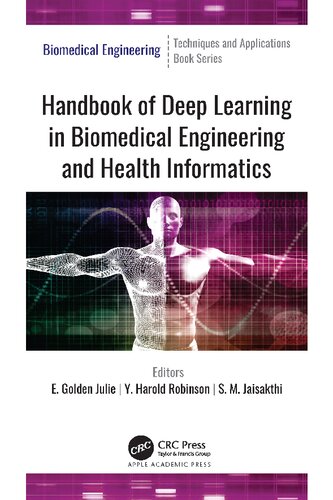

Most ebook files are in PDF format, so you can easily read them using various software such as Foxit Reader or directly on the Google Chrome browser.
Some ebook files are released by publishers in other formats such as .awz, .mobi, .epub, .fb2, etc. You may need to install specific software to read these formats on mobile/PC, such as Calibre.
Please read the tutorial at this link: https://ebookbell.com/faq
We offer FREE conversion to the popular formats you request; however, this may take some time. Therefore, right after payment, please email us, and we will try to provide the service as quickly as possible.
For some exceptional file formats or broken links (if any), please refrain from opening any disputes. Instead, email us first, and we will try to assist within a maximum of 6 hours.
EbookBell Team

5.0
80 reviewsThis new volume discusses state-of-the-art deep learning techniques and approaches that can be applied in biomedical systems and health informatics. Deep learning in the biomedical field is an effective method of collecting and analyzing data that can be used for the accurate diagnosis of disease.
This volume delves into a variety of applications, techniques, algorithms, platforms, and tools used in this area, such as image segmentation, classification, registration, and computer-aided analysis. The editors proceed on the principle that accurate diagnosis of disease depends on image acquisition and interpretation. There are many methods to get high resolution radiological images, but we are still lacking in automated image interpretation. Currently deep learning techniques are providing a feasible solution for automatic diagnosis of disease with good accuracy. Analyzing clinical data using deep learning techniques enables clinicians to diagnose diseases at an early stage and treat patients more effectively.
Chapters explore such approaches as deep learning algorithms, convolutional neural networks and recurrent neural network architecture, image stitching techniques, deep RNN architectures, and more. This volume also depicts how deep learning techniques can be applied for medical diagnostics of several specific health scenarios, such as cancer, COVID-19, acute neurocutaneous syndrome, cardiovascular and neuro diseases, skin lesions and skin cancer, etc.
Key features:
Handbook of Deep Learning in Biomedical Engineering and Health Informatics provides a thorough exploration of biomedical systems applied with deep learning techniques and will provide valuable information for researchers, medical and industry practitioners, academicians, and students.